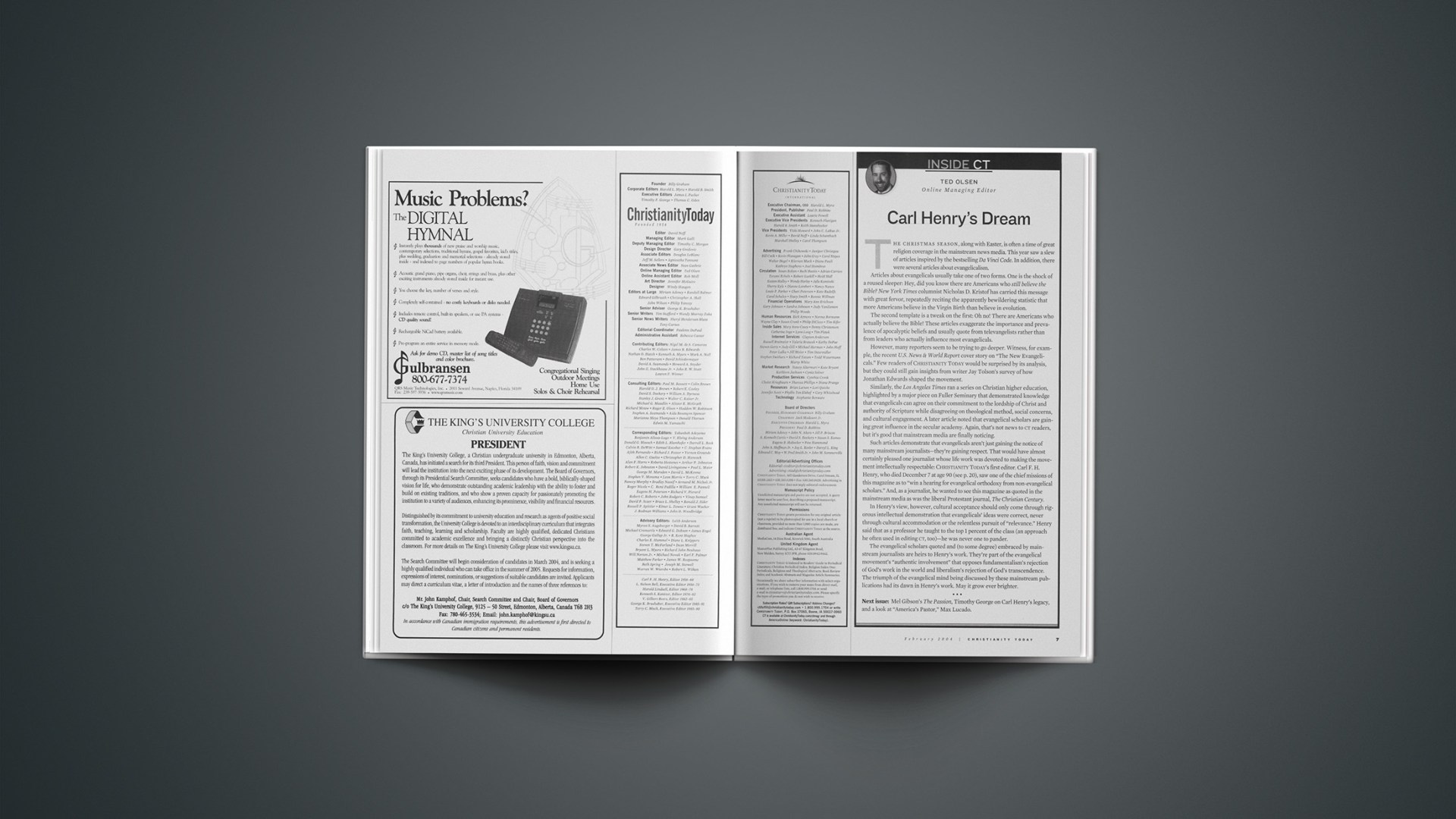The Christmas season, along with Easter, is often a time of great religion coverage in the mainstream news media. This year saw a slew of articles inspired by the bestselling Da Vinci Code. In addition, there were several articles about evangelicalism.
Articles about evangelicals usually take one of two forms. One is the shock of a roused sleeper: Hey, did you know there are Americans who still believe the Bible?New York Times columnist Nicholas D. Kristof has carried this message with great fervor, repeatedly reciting the apparently bewildering statistic that more Americans believe in the Virgin Birth than believe in evolution.
The second template is a tweak on the first: Oh no! There are Americans who actually believe the Bible! These articles exaggerate the importance and prevalence of apocalyptic beliefs and usually quote from televangelists rather than from leaders who actually influence most evangelicals.
However, many reporters seem to be trying to go deeper. Witness, for example, the recent U.S. News & World Report cover story on “The New Evangelicals.” Few readers of Christianity Today would be surprised by its analysis, but they could still gain insights from writer Jay Tolson’s survey of how Jonathan Edwards shaped the movement.
Similarly, the Los Angeles Times ran a series on Christian higher education, highlighted by a major piece on Fuller Seminary that demonstrated knowledge that evangelicals can agree on their commitment to the lordship of Christ and authority of Scripture while disagreeing on theological method, social concerns, and cultural engagement. A later article noted that evangelical scholars are gaining great influence in the secular academy. Again, that’s not news to CT readers, but it’s good that mainstream media are finally noticing.
Such articles demonstrate that evangelicals aren’t just gaining the notice of many mainstream journalists—they’re gaining respect. That would have almost certainly pleased one journalist whose life work was devoted to making the movement intellectually respectable: Christianity Today‘s first editor. Carl F. H. Henry, who died December 7 at age 90, saw one of the chief missions of this magazine as to “win a hearing for evangelical orthodoxy from non-evangelical scholars.” And, as a journalist, he wanted to see this magazine as quoted in the mainstream media as was the liberal Protestant journal, The Christian Century.
In Henry’s view, however, cultural acceptance should only come through rigorous intellectual demonstration that evangelicals’ ideas were correct, never through cultural accommodation or the relentless pursuit of “relevance.” Henry said that as a professor he taught to the top 1 percent of the class (an approach he often used in editing CT, too)—he was never one to pander.
The evangelical scholars quoted and (to some degree) embraced by mainstream journalists are heirs to Henry’s work. They’re part of the evangelical movement’s “authentic involvement” that opposes fundamentalism’s rejection of God’s work in the world and liberalism’s rejection of God’s transcendence. The triumph of the evangelical mind being discussed by these mainstream publications had its dawn in Henry’s work. May it grow ever brighter.
Copyright © 2004 Christianity Today. Click for reprint information.
Related Elsewhere:
Other CT articles on Carl Henry include:
Carl F.H. Henry, Theologian and First Editor of Christianity Today, Dies at 90 | Thinker helped to shape many evangelical institutions and efforts, from higher education to ecumenism. (Dec. 8, 2003)
The Carl Henry that Might Have Been | Carl Henry will be remembered as someone who, in a confusing age, held forth the solid middle of a faith that fortifies the whole human person against the fraying ends of irrationalism and superstition (originally published April 5, 1993, posted online Dec. 8, 2003)
Profiles of Henry are available online from Trinity Evangelical Divinity School‘s magazine, Boston University’s Modern Western Theology site, and elsewhere.
The Billy Graham Center Archives web site has an autographed copy of Christianity Today‘s first issue, along with a February 15, 1956, photo of Graham and the editors.
Eerdmans recently reissued Henry’s classic The Uneasy Conscience of Modern Fundamentalism. Other Henry volumes, including the six-volume God, Revelation, and Authority, Confessions of a Theologian, Twilight of a Great Civilization, Dictionary of Christian Ethics, The Identity of Jesus of Nazareth, Toward a Recovery of Christian Belief, Evangelical Affirmations, and Christian Mindset in a Secular Society, are available at ChristianBook.com, Amazon.com, and other book retailers.
Amazon can also help with several out of print Henry titles, including Gods of This Age Or … God of the Ages?, The Biblical Expositor, and The Ministry of Development in Evangelical Perspective.
Several books about Henry are also available (though out of print), including Carl Henry at His Best, Conversations with Carl Henry, What Is Truth?, God and Culture: Essays in Honor of Carl F.H. Henry, Two Reformers of Fundamentalism, and a biography, Carl F.H. Henry.










